[Forum at Pompeii, with Vesuvius in background]
In AD 79, Vesuvius, the volcano that looms over the bay of Naples erupted, destroying the bustling commercial city of Pompeii, and the smaller luxury resort of Herculaneum. Pompeii was covered by 7 metres of ash and debris; Herculaneum was buried by up to 25 metres of subsequent mudflows. Hundreds of people were killed and the buried towns were largely forgotten.
At the time of the disaster, the admiral of the Roman fleet at nearby Misenum was the renowned naturalist and writer Pliny the Elder. He observed the initial eruption at midday on 24 August (other months have been postulated, but this date is best-known). Fascinated by the towering pine-tree shaped cloud blasted up by the mountain, he ordered a ship to be made ready so he could examine the incident from the sea. As he was leaving his house, a messenger arrived to report that his close friend, Rectina, whose husband Tascius had assembled one of the greatest libraries of the time in their home at the very foot of Vesuvius, was in great danger — along with the precious books. Pliny realised that many other residents of the bay would also need rescue, and set sail with his whole fleet, leaving his sister and her young son behind.
Whilst his ship was rowed to the disaster zone through falling ash, and over waters clogged by floating pumice, he continued to dictate observations of the natural phenomenon. When his helmsman begged him to turn back, Pliny refused, telling the man that Fortune stood by the courageous. The ship reached Stabiae, where Pliny disembarked, bathed, and calmly ate dinner with friends. He even went to bed, and was snoring loudly when his friends woke him, to abandon their shaking house. But the sea was now too rough to take to the ships, and Pliny, struggling to breathe in the sulphurous fume, lay down on the shore to die.
We know all this because that young nephew left behind at Misenum was, of course, Pliny the Younger. The letters he wrote to Tacitus the historian (he of The Agricola fame, the account of the Roman conquest of Britain) are an eyewitness account of the eruption and tell the story of his brave old uncle. Those letters have been preserved to the modern era, and over the past 250 years extensive excavation has brought the buried cities back to life, like flies caught in amber.
It has been the ambition of a lifetime for me to visit these famous sites, as it must be for anyone interested in Roman history. Although much of Pompeii remains hidden still, it’s a unique opportunity to walk the excavated streets, to pass dozens of little shops, explore workshops, laundries, fast food outlets, and roam houses and gardens. But it’s not just the murals, graffiti, and artefacts left behind for archaeology to uncover that so impressed me. Of all the ancient sites I’ve walked, these places are the most magical, because here above all, the townspeople still linger. As I noted in my travel blog (peteandjacmotorbikingandtravels), despite the slavery, the togas, the lack of cars, electricity and internet, to walk in these towns is to rub elbows with long-dead Romans.
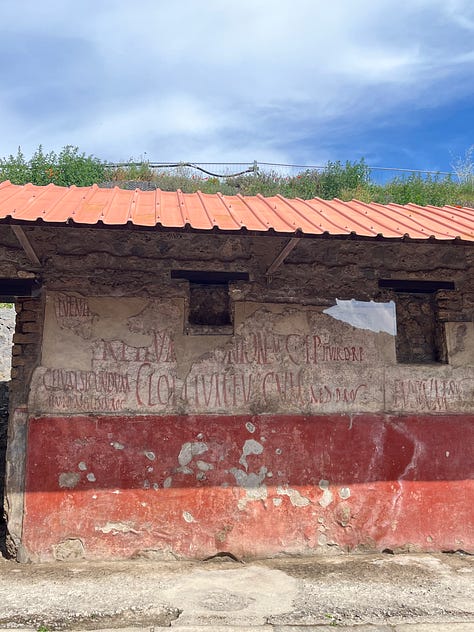
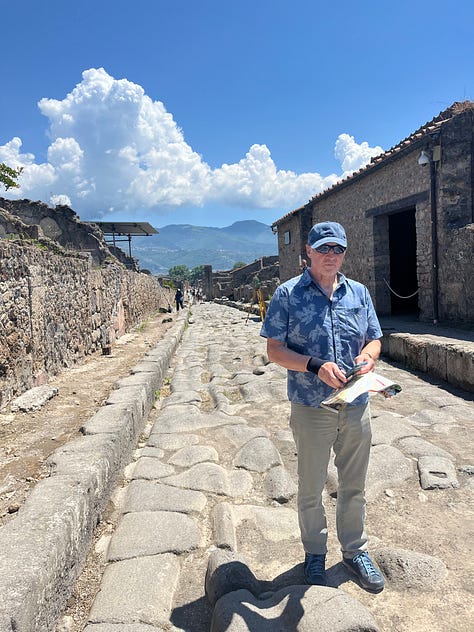

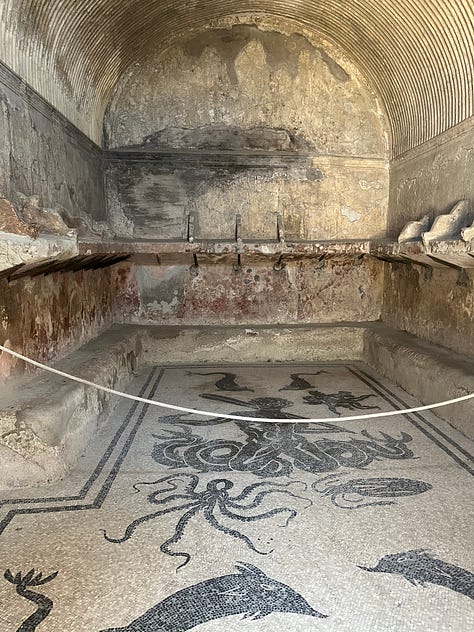
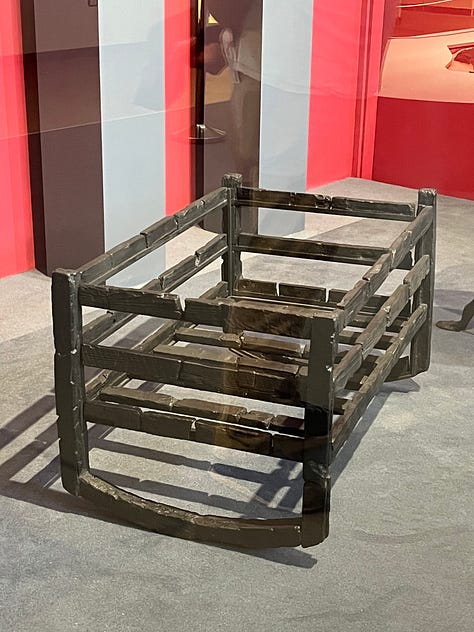

As a writer of Roman fiction, I was bound to feel moved and inspired. And so I was, above all by the last place we saw: the boathouses in Herculaneum, on what was then the seashore.
As you can see, the sea no longer fringes this area. In fact, where I stood to take this picture is the unexcavated spoil dumped by the volcano, much higher than the original shoreline. In these warehouses were found the bodies of more than 300 people, clearly assembled to await rescue by sea. As we know, that rescue never came. Instead, four waves of super-heated air rushed down the mountain’s sides, and the frightened people gathered in the boathouses died. That represents 300 tragedies, each with their individual story to be told.
But the story I want to tell is of someone who was found outside, on the beach. He was lying face down, accompanied by his dagger, his sword and a pouch containing the sort of sum paid monthly to a senior officer. He was at least forty, muscular and fit. Judging by his uniform, he may have been of the elite Praetorian Guard, and just possibly, had been sent by Admiral Pliny to co-ordinate the rescue of the unfortunates on the beach at Herculaneum.
We’ll probably never know who this man was, or what his mission had been. And that suits me fine; I have enough details to fire the imagination, but not too many to limit my storytelling. Somehow, it seems fitting that what I eventually bring back from my visit is my own tribute to one very brave man, who died doing his duty.
Anthology: The Ring
The anthology of historical short stories written by a group of author friends and me was published on 1 May. I’m very happy to say it shot to #1 in its Amazon category straightaway. Since then it’s sold steadily in ebook and paperback, each sale making money for our chosen charity, The Reading Agency. We’re thrilled, of course, and if I say so myself, they’re all excellent stories. The anthology is based on the theme of Fortuna’s ring, passed down the generations, and not always bringing good luck. The book is currently on book blog tour; here’s a fantastic recent review from Mason’s Menagerie. If you like short stories, or crime/historical fiction, or just enjoy a damn good read, please buy and share with your friends and family. Every penny raised will be spent on improving adult and child literacy through UK libraries, a cause very dear to all our hearts.
My News
The Silver Mirror, the opening book in my new Otto Cornelius series, is now finished and with my publisher. That was quite the labour of love, taking only five months from first idea to completion. I’m already working on the next in series — working title The Salt Road — which, as the title suggests, will feature Droitwich Spa as well as Wroxeter. I’ve arranged to meet a distinguished archaeologist familiar with Roman Shropshire and environs next month, but I can already tell you a Roman-period skeleton found in a brine pit in Droitwich has inspired the starting point. More next month on my research for this new mystery.
National Crime Reading Month is almost upon us. If you’re UK-based, look out for crime reading events in libraries and bookshops throughout June. I’ve got a couple of author events being arranged. At 6.30 on Tuesday 24 June, I’ll be In Conversation with fellow crime writers Linda Mather and Sarah Hilary at Ledbury library. This a ticketed event including a glass of wine, so you’ll need to check with the library (01432 383499) if you’re in the area. Before that, I’m part of an author panel being organised by The Hive at Worcester. Details have yet to be finalised, but it’s likely to be sometime w/c 16 June. I’ll send out a flash with more on that shortly.
That’s all for this newsletter. Next month I’ll be reviewing my recent reading, and no doubt will have tales to tell from NCRM. Check my Youtube channel for my latest research videos; if you’re interested to find out more about my trip to Roman sites in Marseille and Nice, as well as Pompeii, Herculaneum, and old Naples, go to my travel blog. (Click on Pilgrimage to Pompeii for the drop-down menu.)
Bye for now!
All Jacquie’s books, short stories, non-fiction articles and her Youtube channel with dozens of research videos can be found on Linktree. Just keep scrolling!



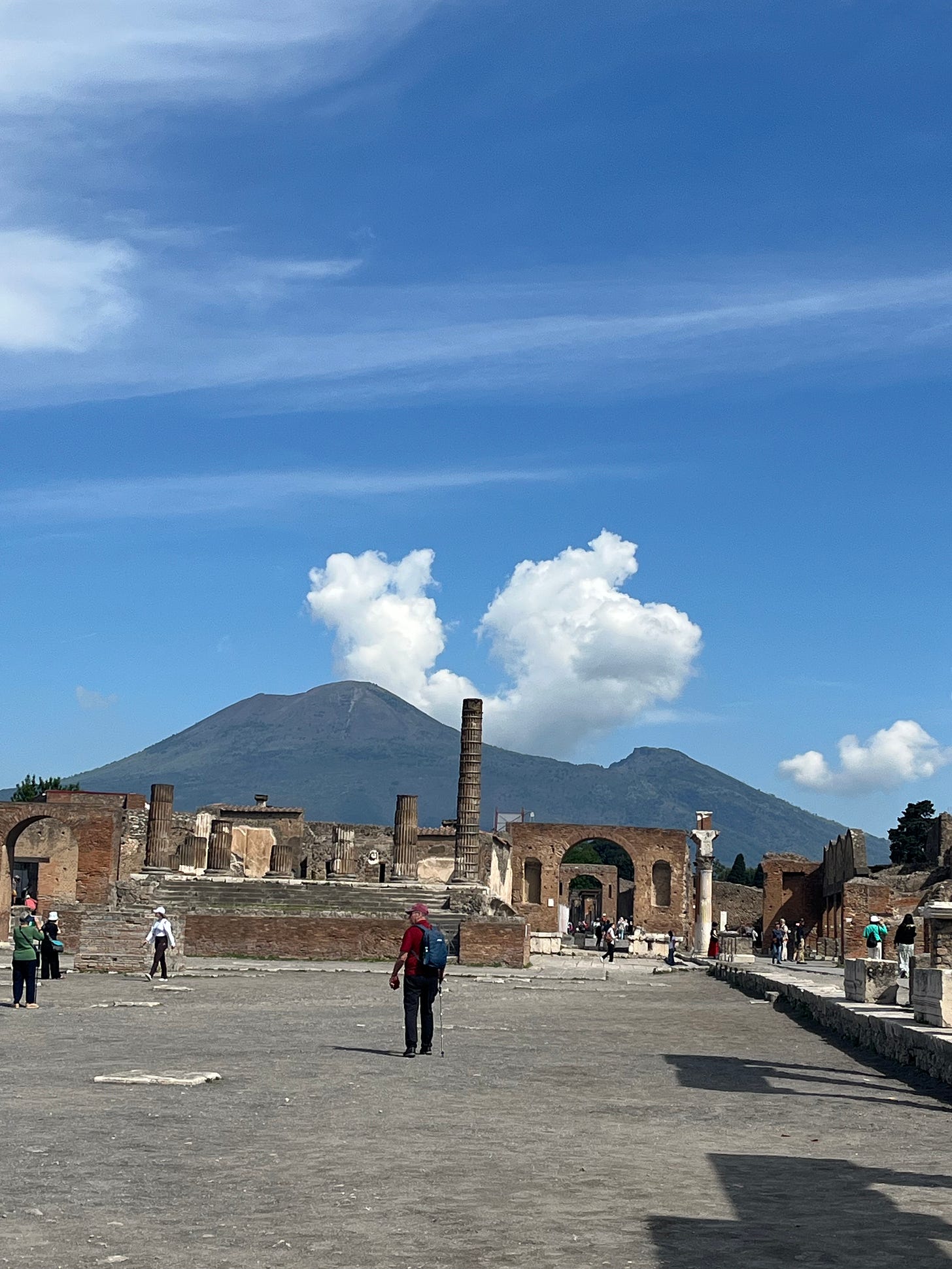


An excellent and informative read Jacquie. Good luck with your new series.